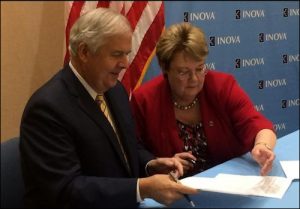
Inova CEO Knox Singleton and UVa President Teresa Sullivan sign partnership deal. Photo credit: Washington Business Journal
by James A. Bacon
The University of Virginia and Inova Health System have joined forces in a $112 million partnership to launch a medical campus and a biomedical research initiative in Fairfax County. The partnership has three main components:
- A cancer research partnership between the Inova Schar Cancer Institute and UVa. Cancer Center. The aspiration is to achieve designation by the National Cancer Institute as a Comprehensive Cancer Center, which would enhance the center’s prestige and open new avenues for research funding.
- A regional campus of the U.Va. School of Medicine, which will enable UVa. medical students to complete clerkships and post-clerkship education at Inova hospitals in Northern Virginia.
- A research partnership to develop the Global Genomics and Bioinformatics Research Center at The Inova Center for Personalized Health.
As part of the expanded relationship, UVa’s Darden School of Business will lead a business accelerator to speed the commercialization of medical research and the incubation of companies with innovative products.
Most of the activities will take place at the Inova Center for Personalized Health on the former Exxon Mobil campus located near Inova Fairfax Hospital, Inova’s flagship hospital.
“U.Va. is one of the most prestigious research universities in the country, and Inova is one of the largest, most successful health-care systems,” Knox Singleton, CEO, Inova Health System, said in a prepared statement. “This partnership leverages the complementary strengths of two institutions committed to providing the most advanced treatments and prevention strategies to the communities we serve.”
Twenty-eight million in funding will come from the Commonwealth of Virginia. Inova will raise another $56 million, and UVa will chip in $28 million. Dr. Richard Shannon, executive vice president for health affairs at UVa, told the Daily Progress that he did not know where UVa’s share will come from, although one possible source is the university’s new Strategic Investment Fund, which is expected to throw off about $100 million annually.
Meanwhile, in western Virginia… Virginia Tech plans to absorb the Virginia Tech Carilion School of Medicine in Roanoke within the next two years, according to Virginia Business. “Our school is a research-intensive medical school and to be able to identify that research you have to be part of the university. That was one of the drivers,” says Nancy Howell Agee, Carilion Clinic’s president and CEO.
Bacon’s bottom line: I am ambivalent about these developments. On the positive side, the UVa-Inova and Tech-Carilion partnerships could create the critical mass it takes to break into the biomedical big leagues. Both are targeting emerging fields of medicine in which they don’t have to compete against entrenched biomedical powerhouses. The potential exists to create important new drivers of economic growth in Northern Virginia and the Roanoke-Blacksburg regions, giving new impetus to Virginia’s lethargic economy.
Whether these partnerships can construct the research-clinical-entrepreneurial ecosystems it takes to be successful remains to be seen. Northern Virginia has a respectable (though modest by Silicon Valley standards) angel financing/venture capital sector which should be capable of supporting the commercialization of new technologies. Proximity to the National Institutes of Health in Bethesda, Md., is a bonus for snagging research dollars. The Roanoke-Blacksburg area, which lacks these advantages, is more problematic.
What concerns me is how these initiatives are arising from large, lumbering not-for-profit organizations — health systems and universities — that are raising their capital not from capital markets, where their deals will be subjected to close scrutiny by investors, but from their own internal resources.
Unlike private enterprises, universities and hospitals don’t pay income taxes and they don’t pay dividends. Not-for-profit hospitals extract “surplus” revenues (what for-profit enterprises would call profit) by charging patients more than they need to. Universities extract wealth by over-charging students. In other words, it can be argued that that Inova, Carilion, UVa and Virginia Tech are building their research empires on the backs of patients and students with little accountability to the public. Hospital and university boards, far from representing the interests of patients and students, are rah-rah cheerleaders for institutional growth.
Business communities and the political establishment are cheering these initiatives as well. The lack of public debate is appalling.


